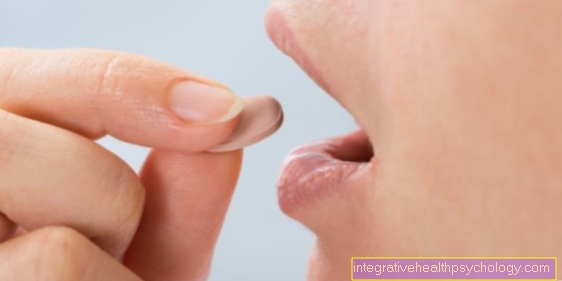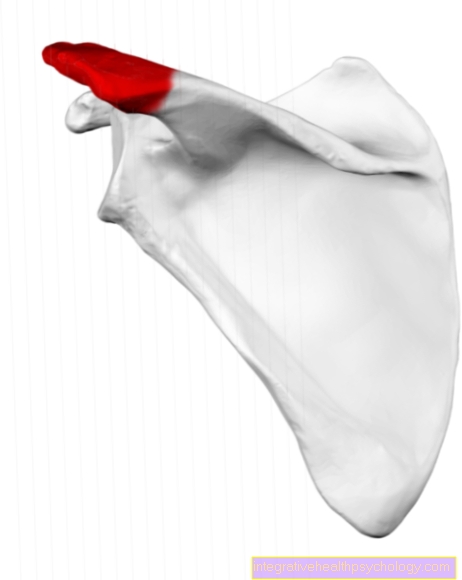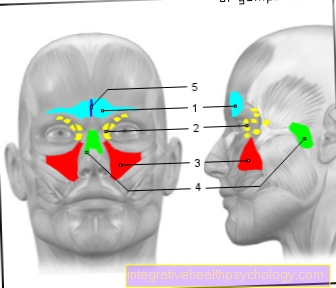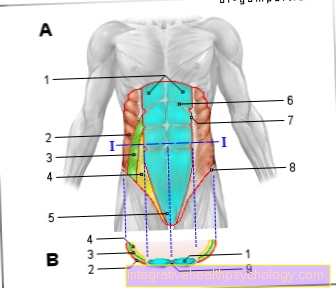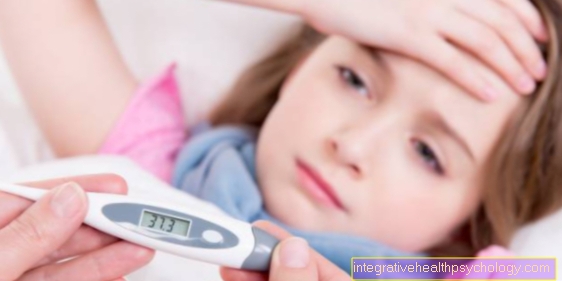Effect of the morning-after pill
introduction
Any woman can have unprotected sexual intercourse due to various circumstances. Typical reasons for this are forgetting to take a pill or a torn condom. In order to still prevent pregnancy, there is the so-called "morning-after pill". It is also known as an emergency contraceptive and can prevent pregnancy if taken promptly. The EllaOne®, whose active ingredient is ulipristal acetate, is considered to be the "first choice" in Germany. Your cheaper alternative would be the PiDaNa® with the active ingredient levonorgestrel. However, since both active ingredients can also cause some side effects, they should not be used as permanent contraception despite their effectiveness.
Read more on the topic: Morning-after pill.
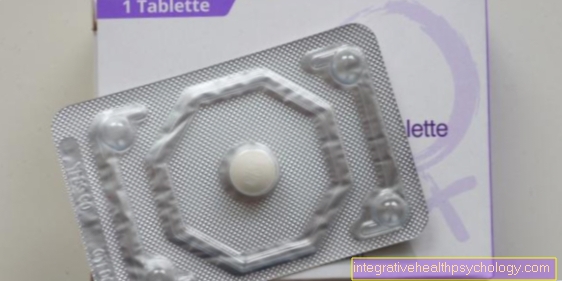
Woman's cycle: ovulation
In order to understand the effect of the morning-after pill, a brief explanation of the course of the female cycle follows.
In a normal cycle (28 days), ovulation begins between the 12th and 16th day of the cycle. Most women ovulate on the 14th day, in the middle of the cycle. With the help of an ovulation calculator or ovulation calendar, the exact time of ovulation can be calculated. Some women may experience ovulation as a brief, sharp pain in the ovary area, but most women do not feel it. After ovulation, the egg can be fertilized for 12 to 24 hours, which means that if it comes into contact with sperm, pregnancy can occur. It is important to know that the mean survival time of sperm is around 2-3 days. If a woman had unprotected sexual intercourse a few days before or exactly on the day of ovulation, there is a possibility of pregnancy.
For ovulation itself, the hormone LH (luteinizing hormone) is required. Shortly before ovulation, its concentration increases enormously, so that the so-called LH peak (an LH peak concentration) and thus ovulation occurs. After ovulation, the burst follicle begins to produce the hormone progesterone, which is responsible for creating ideal conditions for pregnancy. For example, progesterone builds up the lining of the uterus, in which the fertilized egg cell can implant. However, if the egg cell fails to be fertilized, other hormones (estrogens) are formed in the course of the process, which break down the uterine lining and thus trigger the menstrual period.
Read more on the topic: Menstrual period.
Mechanism of action of the morning-after pill
The principle of action of the morning-after pill is mainly the timely inhibition or delay of ovulation. Depending on the active ingredient, this can be delayed by 5 days (ulipristal acetate) or 3 days (levonorgestrel). The active ingredients ulipristal acetate and levonorgestrel reduce the hormone LH (luteinizing hormone), which is necessary for ovulation, by blocking the LH receptor, which means that LH can no longer bind and develop its effect. This means that the LH peak, which is important for ovulation, does not occur. Ovulation with the formation of a fertile egg cell and unwanted pregnancy are thus prevented. If, however, ovulation has already taken place at the time of taking the pill, the effect of the morning-after pill is powerless, as it does not prevent fertilization itself or the egg cell from implanting in the uterus, but only postpones the time of ovulation. For this reason, it is important to take the morning-after pill as soon as possible after unprotected intercourse.
When is the morning-after pill taken?
The morning-after pill can be used whenever there has been unprotected intercourse before ovulation. This can be due to forgetting to take a pill, a torn condom or the reduced effectiveness of the pill (e.g. while taking antibiotics or vomiting / diarrhea).
Read more about the topics: Forgot the pill - what should be considered? and pill doesn't work.
How long after the GM can the morning-after pill be taken?
It is generally advisable to take the morning-after pill as soon as possible after unprotected intercourse. The EllaOne (ulipristal acetate) can be taken up to 120 hours (5 days) after unprotected sexual intercourse, the PiDaNa (levonorgestrel) up to 72 hours (3 days) afterwards. It is important to know that the effectiveness of the morning-after pill decreases every day after unprotected sexual intercourse. If violent vomiting or diarrhea should occur within the first 3 hours after taking the morning-after pill, the morning-after pill must be taken again to ensure that the drug works properly.
Effect of the morning-after pill after ovulation
If ovulation took place during or shortly after unprotected sexual intercourse, pregnancy can no longer be prevented by the action of the morning-after pill. For this reason, gynecologists and pharmacists ask about the regularity, the average cycle length and the exact day on which sexual intercourse took place. This allows the approximate time of ovulation to be calculated and the effect of the morning-after pill to be estimated. If unprotected sexual intercourse took place 1-2 days before ovulation, it is recommended to take the morning-after pill. However, if unprotected sexual intercourse took place on the day of ovulation or a few days later, the effect of the morning-after pill is no longer guaranteed. In these cases, implantation of the “coil” can be recommended or abortion methods can be used. If sexual intercourse took place in the second half of the cycle (i.e. shortly before menstruation), the morning-after pill is usually recommended. no longer required, as the egg cell is no longer capable of fertilization at this point.
Effectiveness of the morning-after pill for overweight
Overweight patients should note that the effectiveness of the morning-after pill decreases with increasing body weight. For example, the dosage of PiDaNa® is designed for a maximum body weight of 70 kg and loses its effect from 75 kg weight. The EllaOne® loses its effectiveness from 90kg body weight and is completely ineffective from 95kg. Overweight women are therefore more likely to use a copper IUD. For this you should seek advice from a gynecologist of your choice.
Side effects of the morning-after pill
As a rule, the morning-after pill is very well tolerated. Occasionally, you may experience nausea, vomiting, headache, abdominal pain, or dizziness. In some cases there may be delays or premature menstruation. The formation of unwanted blood clots (so-called thrombosis) is unlikely because the morning-after pill does not contain any estrogens.
Read more on the topic: Side effects of the morning-after pill.
Period after taking the morning-after pill
After taking the morning-after pill, menstrual bleeding should start at the usual time. In some cases there may be delays or your period may start prematurely in the form of intermenstrual bleeding. In some cases the menstrual period may be longer than usual. However, if menstruation is only very weak or has not occurred after more than 5 days, this can be an indication of a possible pregnancy. It should urgently be clarified by the gynecologist.
Read more on the topic: Signs of pregnancy.
"Normal" pill after taking the "morning after pill"
The morning-after pill only postpones the time of ovulation, so it does not provide permanent protection against pregnancy. For this reason, it is imperative that you continue to use contraception for the rest of your cycle. The "normal" pill can continue to be taken as usual. For the first 7 days after unprotected intercourse, a condom should be used in addition to the pill. After that, the contraceptive pill should have started working again. At the end of the cycle, the normal pill break should be observed.
Read more on the topic: prevention.
How do you get the morning-after pill?
The morning-after pill used to be a prescription drug in Germany. Since March 16, 2015 this law has been changed; the morning-after pill is now available in all pharmacies without a prescription. Due to their cycle-dependent effect and the possible side effects, a gynecologist should always be consulted in case of doubt. The cost of the morning-after pill is between € 18 (PiDaNa) and € 35 (EllaOne) and must be borne by the women themselves. Women under the age of 20 can get the morning-after pill reimbursed by their health insurance company, but need a doctor's prescription for this.
Read more on the topic: The cost of the morning-after pill.
Alternatives to the morning-after pill
An alternative to the morning-after pill, which still works after ovulation, is the insert of the copper IUD, which also serves as a long-term contraceptive. This can be inserted up to 5 days after unprotected sexual intercourse and prevents pregnancy with 99 percent certainty. It is assumed that the permanently released copper components have a toxic effect on sperm and at the same time cause a change in the uterine mucus, which makes it harder for the egg to implant. Possible side effects of the copper IUD are pelvic pain, increased menstruation and possibly slipping of the IUD, which women do not notice. There can also be an increased risk of abdominal infections.
Read more on the topic: Spiral.



.jpg)

